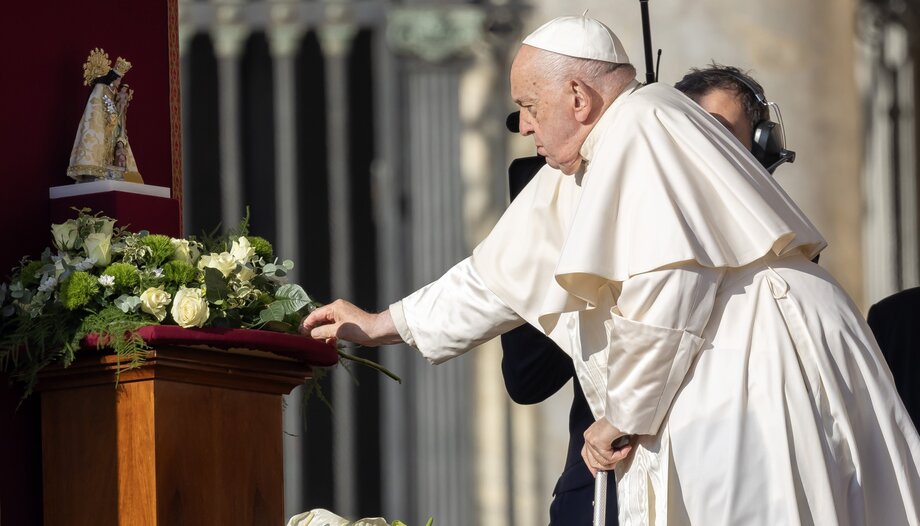Before starting the Audience and at the conclusion, Pope Francis prayed the following prayer again for the victims, their families, and the affected for the recent floods in Valencia and its people, explaining that the image of the Virgin of the Forsaken located on the podium had been given to him as a gift from there.
"Salute to the Virgin of the Forsaken, the patron saint of Valenciawhich suffers so much from the water, and also other parts of Spain. Valencia is under water and suffers. I wanted the patron saint of Valencia to be here, this image that the Valencians have given me," he said.
"Let us not forget Valencia, Spain," he reiterated. "Today is with us the Virgen de los Desamparados, patron saint of Valencia, I invite you to pray a Hail Mary."
The Holy Spirit and Christian prayer
In the series of catecheses on the Holy Spirit, which has completed its session Twelfth, the Roman Pontiff dedicated the catechesis to the Holy Spirit and Christian prayer, in which he followed the text, but with several improvised moments in which he taught to address the Paraclete with the heart, "not like parrots", and knowing that "God is greater than our sin, because we are all sinners".
"The Spirit of God is both the object and the subject of prayer. He is the object when we pray to receive him, when we ask him, when we invoke him," the Pope pointed out. "For example, the Church implores Him in the Holy Mass, so that He may descend and sanctify the bread and wine, And He is subject, when He Himself prays in us helping us in our weakness, because as St. Paul says, we do not know how to pray as we ought."
The Holy Spirit reveals himself in prayer as the Paraclete, that is, "as an advocate and defender, who intercedes before the Father so that we may taste the joy of his mercy. But in addition to interceding for us, the Holy Spirit teaches us to intercede for our brothers and sisters. And this intercessory prayer pleases God because it is gratuitous and disinterested. When we pray for others, and others pray for us, prayer is multiplied".
"Pilgrims of hope".
In his greeting to pilgrims of different languages, the Pope added some comments. For example, to the Spanish-speaking pilgrims he said that "in this time of preparation for the Jubilee, let us ask the Holy Spirit to intercede for us so that we may be pilgrims of hope, ready to always follow Jesus, who is the Way, the Truth and the Life".
In his greeting to the Polish pilgrims, he recalled the prayer for the deceased, and to the Italian pilgrims, he asked once again that we pray for peace in the martyred Ukraine, in Gaza - he recalled the 153 civilians machine-gunned the other day - in Israel, in Myanmar.
"It gives us true prayer."
In his catechetical reflection, the Pope recalled "another aspect, which is the most important and encouraging for us: it is the Holy Spirit who gives us true prayer. The Spirit," says St. Paul, "helps us in our weakness. For we do not know how to pray as we ought, but the Spirit himself intercedes for us with ineffable groanings; and he who searches our hearts knows what the aspiration of the Spirit is, and that his intercession on behalf of the saints is according to God" (Rom 8:26-27). (Rom 8:26-27).
"It is true, we do not know how to pray. The reason for this weakness in our prayer was expressed in the past with a single word, used in three different ways: as an adjective, as a noun and as an adverb. It is easy to remember, even for those who do not know Latin, and it is worth keeping in mind, because it alone contains a whole treatise."
"Sons of God."
"We human beings used to say, "mali, mala, male petimus", which means: being bad (mali), we ask for the wrong things (mala) and in the wrong way (male). Jesus says: 'Seek first the Kingdom and the righteousness of God, and all these things will be given to you as well' (Mt 6:33); on the other hand, we seek first of all 'the extra', that is, our interests, and we totally forget to ask for the Kingdom of God".
"The Holy Spirit comes, yes, to help us in our weakness, but he does something even more important: he testifies to us that we are children of God and puts on our lips the cry: 'Abba, Father' (Rom 8:15; Gal 4:6)," he stressed.









